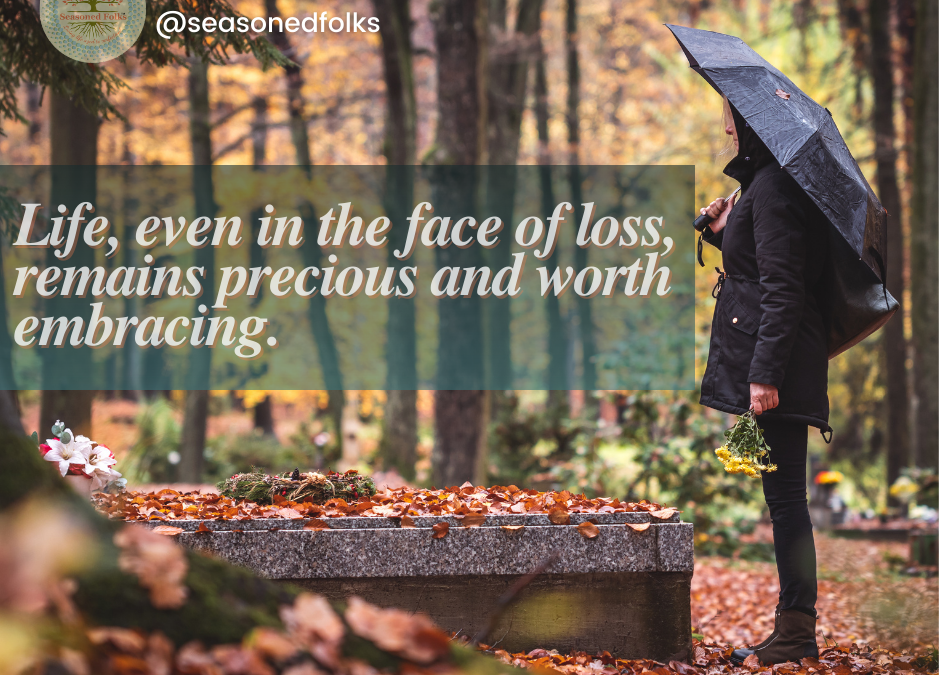Senior grief is an unavoidable part of aging, bringing with it a persistent and profound reality of loss. As we journey through life, we inevitably say goodbye to cherished family members, close friends, and spouses. The longer we live, the more these losses accumulate, weighing heavily on our hearts and minds. This cumulative grief can lead to unseen trauma, often going unrecognized and unaddressed.
Although grief is a universal experience, senior grief presents unique challenges. The emotional toll of losing multiple loved ones, combined with physical and cognitive changes that come with aging, can make processing grief more difficult. Understanding how senior grief affects older adults and how to navigate it can help bring healing and comfort in later years.
The Unseen Trauma of Senior Grief
Senior grief is not just an emotional experience—it has lasting psychological, physical, and social repercussions. Many seniors experience what is known as “cumulative grief,” a layering of losses that makes each new death even harder to process. Unlike younger adults who may experience loss sporadically, seniors often face consecutive losses, intensifying the grief response. When senior grief is prolonged or suppressed, it can manifest in various ways:
- 🏠 Emotional Isolation: Many seniors withdraw from social activities, feeling as though no one truly understands their grief or fearing future losses.
- 😞 Depression and Anxiety: Lingering sadness, restlessness, or feelings of hopelessness can develop, sometimes leading to clinical depression.
- 🧠 Cognitive Decline: Unprocessed senior grief may contribute to forgetfulness, confusion, and difficulty concentrating.
- 🤕 Physical Symptoms: Sleep disturbances, fatigue, headaches, digestive issues, and even heart problems can be linked to unresolved senior grief.
- 🎯 Loss of Purpose: The passing of loved ones can leave seniors questioning their purpose, especially if they have lost a spouse or lifelong friend.
Recognizing the Signs of Unprocessed Senior Grief
Because senior grief can manifest unexpectedly, it’s essential to recognize the signs that an older adult may be struggling:
- 🍽️ Changes in eating or sleeping habits, such as loss of appetite or insomnia.
- 🎭 Loss of interest in activities that once brought joy.
- 🤔 Increased forgetfulness, disorganization, or confusion.
- 😡 Frequent irritability, mood swings, or unexplained sadness.
- 🚪 Avoidance of social interactions and disengagement from family and friends.
- 💢 Complaints of persistent aches and pains without a clear medical cause.
- ⏳ Increased talk about mortality, loneliness, or a desire to “be with” lost loved ones.
Recognizing these signs early can help prevent prolonged suffering and provide opportunities for intervention and support for those experiencing senior grief.
Navigating the Weight of Senior Grief
While loss is an unavoidable part of aging, there are ways to help seniors navigate and cope with their grief effectively.
1. Acknowledge and Express Feelings 🗣️
Bottling up emotions can lead to emotional distress and physical health problems. Encouraging open conversations about senior grief is essential. Talking about loved ones who have passed, sharing memories, and expressing emotions through journaling, support groups, or one-on-one conversations can help seniors process grief rather than suppress it.
2. Stay Connected 🤝
Isolation only intensifies senior grief. Engaging with social groups, faith-based communities, or bereavement support groups provides emotional support and allows seniors to connect with others who have experienced similar losses. Encouraging regular phone calls, visits, or even virtual connections with family and friends can make a significant difference.
3. Find New Purpose 🎨
Finding meaningful activities can help ease feelings of senior grief. Volunteering, mentoring younger generations, joining clubs, or taking up hobbies such as painting, gardening, or writing can provide a renewed sense of purpose. Seniors who stay engaged in activities they enjoy often experience improved emotional well-being and resilience in the face of grief.
4. Maintain Physical and Mental Well-being 🏃
Physical health is closely linked to emotional well-being. Regular physical activity, such as walking, yoga, or swimming, can boost mood and improve overall health. Engaging in cognitive activities like reading, puzzles, or lifelong learning helps keep the mind sharp and can reduce feelings of loneliness. Additionally, practicing mindfulness or meditation can provide relaxation and emotional balance when dealing with senior grief.
5. Consider Professional Help 🩺
If senior grief becomes overwhelming or leads to severe depression, seeking the support of a therapist, counselor, or grief specialist can be highly beneficial. Many professionals offer tailored support for seniors, helping them navigate their grief while addressing other mental health concerns. For some, medication prescribed by a healthcare provider may also be helpful in managing symptoms of depression or anxiety related to grief.
6. Honor and Celebrate Lost Loved Ones 🌿
Creating meaningful rituals to honor those who have passed can help process senior grief positively. Some ideas include:
- Keeping a journal of memories. (Check out our Journals)
- Celebrating birthdays or anniversaries with a small gathering.
- Planting a tree or garden in their memory.
- Creating a photo album or digital tribute.
- Participating in a cause or charity in their honor.
These practices help keep the memory of loved ones alive while also providing comfort and a sense of connection for those experiencing senior grief.
Here is a “cheat sheet” you can download to help you. Grief Support Guide: Helping Seniors Cope with Ongoing Loss
The Role of Family and Caregivers in Supporting Senior Grief
Family members and caregivers play a crucial role in helping seniors navigate senior grief. Here are some ways to offer meaningful support:
- Listen with empathy: Allow seniors to express their grief without judgment.
- Encourage social interactions: Gently invite them to participate in family events or outings.
- Offer practical assistance: Help with daily tasks that may feel overwhelming during times of grief.
- Respect their grieving process: Everyone grieves differently; be patient and understanding.
- Monitor for signs of severe distress: If grief leads to self-neglect or thoughts of hopelessness, encourage professional intervention.
By providing compassionate support, loved ones can help seniors process their grief in a healthy way.
Final Thoughts
Senior grief is an inevitable part of growing older, but it doesn’t have to define our later years. By acknowledging losses, seeking support, and embracing life with purpose and connection, seniors can honor their loved ones while continuing to live meaningfully. While we may carry more grief, we also carry the strength, resilience, and wisdom to navigate it. Life, even in the face of loss, remains precious and worth embracing.
Understanding senior grief, recognizing its impact, and implementing healthy coping strategies can lead to a fulfilling life despite the pain of loss. With the right support and mindset, seniors can find comfort, connection, and a renewed sense of purpose in their later years.
This site uses affiliate links and some purchases may result in affiliate commissions.


0 Comments